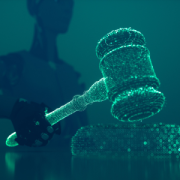AI has been steadily making its way into the legal system, particularly in the form of research (e-discovery and evidence analysis), litigation support (case management, litigation prediction), and risk assessment (compliance) tools. Judicial decision-support systems are also used for sentencing recommendations and parole eligibility determination/prediction (i.e., propensity to re-offend). As this Advisor explores, some countries are taking a more encompassing approach to integrating AI into their legal systems. For example, China has deployed AI-driven “smart judges” designed for virtual, Internet courts that automate small claims legal processes. Recently, the United Arab Emirates (UAE) announced it will integrate AI into its overall lawmaking processes to streamline its legislative efforts.
China’s Smart Courts
China’s virtual Internet courts offer a vivid example of the potential of integrating AI technology into a judicial system. Typically referred to as “smart courts,” these systems are designed to handle Internet-related issues around e-commerce, intellectual property rights, and online financial disputes. First introduced in 2017 in the tech hub city of Hangzhou, China has now expanded smart courts to other cities, including Beijing and Guangzhou.
Through the innovative use of AI, blockchain, and other digital technologies, smart courts are designed to enhance the efficiency, accessibility, and transparency of the legal process: litigants can file cases, present evidence, and participate in hearings entirely online. To ensure the integrity of evidence and other legal information, blockchain serves to verify, timestamp, and maintain submitted documents, which helps reduce risks around tampering and fraud.
The most impressive aspect of smart courts is their smart judges, who use AI to assist with case management and evidence analysis and to generate recommendations based on legal precedents. Other online dispute-resolution tools provide additional means for parties to resolve legal disputes without resorting to [physical] court appearances. These features help speed up case resolution.
China’s Internet courts demonstrate the potential benefits of integrating AI into governance, serving as a global example of innovation in the legal system. Smart courts automate and streamline the legal process, providing benefits around time savings and legal resources. This is especially beneficial to a country with such a massive population and high volume of court cases. That said, although AI provides the intelligence behind China’s smart courts and smart judges, ultimately, human judges retain overall authority and have the final say on verdicts and other decisions.
UAE’s Regulatory Intelligence Ecosystem
UAE plans to use AI to develop a new intelligent system that will help create and maintain the country’s laws. The regulatory intelligence ecosystem, approved by UAE’s Cabinet in April 2025, aims to integrate AI into lawmaking to accelerate legislative reform by enhancing the efficiency, accuracy, and responsiveness of the country’s legislative processes. UAE Prime Minister Sheikh Mohammed bin Rashid Al Maktoum announced the decision to build the system in several posts on X, describing how it will make extensive use of AI for creating new laws and monitoring their impact on the country at the national and local levels.
The system will employ an AI-powered “legislative mapping” capability to generate a centralized map that links all UAE federal and local laws with judicial rulings, executive procedures, and public services. Key functionality includes the ability to perform real-time impact analysis — including tracking the daily effects of laws on UAE society and the economy and recommending updates to laws as determined via big data analysis. The system will also issue findings directly to lawmakers, with the AI-driven approach expected to help reduce legislative drafting time by up to 70%.
The ecosystem takes a global perspective to lawmaking: it will connect UAE laws with leading global research centers. The goal: align UAE laws with international standards while maintaining local relevance; this includes continuously monitoring global legislative trends, identifying gaps and inconsistencies within UAE laws, and suggesting reforms. According to the prime minister, this new legislative system, powered by AI, “will change how we create laws, making the process faster and more precise. It will ensure that our legislative framework stands out, aligning our laws with the best global practices while staying true to the unique path of our rapid development.”
This system marks a significant development in AI-driven governance, making UAE one of the first countries to adopt such an encompassing, data-driven, adaptive legal framework. Of course, the system still needs to be built. To facilitate implementation, UAE has established a new Regulatory Intelligence Office (RIO) to oversee the project. UAE is no stranger to AI; its “National Strategy for AI 2031” aims to integrate the technology across various economic sectors, while its Ministry of Justice has already deployed several AI legal tools, including a virtual legal advisor and family law bot.
Issues & Ethical Considerations
Despite its potential to enhance accessibility, efficiency, and accuracy, applying AI in legal domains presents several issues and considerations. Concerns around bias, transparency, and accountability are frequently cited by those who oppose the use of AI in legal decision-making.
Bias
Building AI systems requires huge amounts of data for model training and testing. This typically involves historical data, meaning there is the risk that the AI models and algorithms used in legal systems could learn existing prejudices pertaining to race, sex, gender, age, socioeconomic, and other biases. As a result, decisions rendered by an AI legal system could unfairly disadvantage certain groups, thereby unintentionally perpetuating racial, socioeconomic, or other systemic biases. All data used for training and testing purposes should be thoroughly vetted to weed out biases.
Transparency & Accountability
The biggest drawback with AI technology remains its inability to provide a good explanation. This is particularly true of systems employing deep learning neural networks. Consequently, lack of transparency in AI legal systems is a serious issue because it can undermine public trust and lead to skepticism about the fairness of AI-driven outcomes and even a jurisdiction’s legal system in general.
Accountability with AI legal systems is tricky, too. In the case of mistakes, who or what should be held accountable? The officers of the court or other legal professionals? The systems developers? Establishing transparency and clear accountability is crucial for ensuring that justice is fair and for maintaining both the court’s and the public’s confidence in AI legal systems.
Dependence on AI Over Human Judgment
While AI can assist in automating legal processes, it should not take precedent over human judgment. The legal system (i.e., overall legal process) could become too reliant on AI, which could undermine the justice process. Law is a very complex field requiring human discretion, intuition, judgment, moral understanding, and empathy for its application, especially when it comes to weighing the intricacies of complex legal cases requiring the analysis and understanding of human behavior. Consequently, lawmakers should ensure that AI remains a tool rather than the primary decision maker in legal systems.
Adaptability & Interpretation
Laws, and their application in legal cases, often require nuanced interpretation as well as adaptation to the evolving needs of society. AI legal systems may not be able to adapt fast enough (have new models trained) to take into account changing political, cultural, and economic trends in the same way that humans (e.g., judges and attorneys) can. Additionally, it may prove difficult to amass sufficient data for training new models. Taken together, these challenges underline the need for strong human oversight, ethical guidelines, and transparency when integrating AI into legal processes.
Conclusion
AI is rapidly reshaping the legal landscape. While some countries are adopting nuanced approaches to its integration, others are ambitiously incorporating AI into their legal systems to streamline processes and boost efficiency. Innovations range from smart judges presiding over virtual courts to advanced systems capable of drafting laws and assessing their impact on society. In short, these developments signal a transformative era in legal technology. Alongside these advancements are serious challenges that must be solved — issues around bias, accountability, transparency, and ethical concerns. Addressing these challenges will require developing comprehensive ethical frameworks, transparent systems, and applying continued human oversight to ensure that AI serves as a tool for justice rather than a source of uncertainty. Ultimately, striking the right balance will be critical in harnessing AI’s potential while safeguarding fairness and trust within the legal domain.



